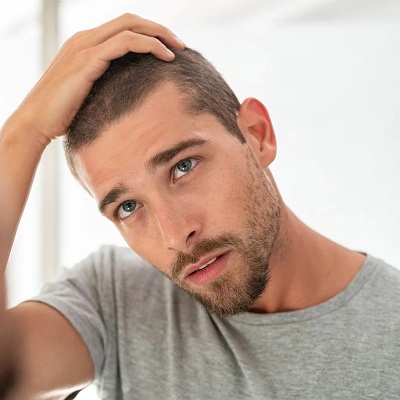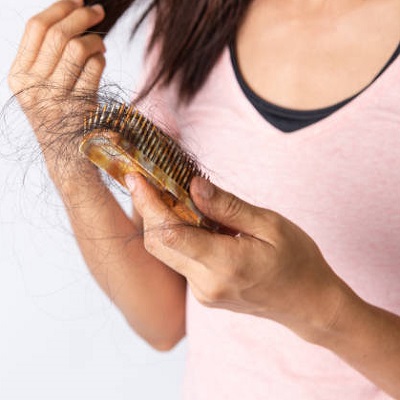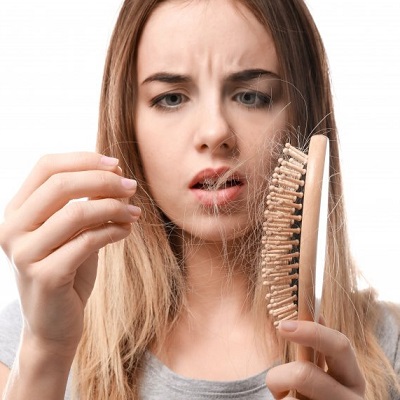
A disruption in the body’s cycle of hair creation is the cause of hair loss, also known as alopecia. Although it may happen elsewhere in the body, hair loss often affects the scalp. The scalp has 100,000 hairs on average, which go through cycles of growth, rest, falling out, and regeneration. Moreover, several variables lead to different types of hair loss in women. It ranges from hormone changes to hereditary predispositions. Therefore, we straighten out the aspects of female hair loss in this in-depth blog, illuminating the many reasons and possible solutions.
What Causes Female Hair Loss?
The term hair loss refers to the sudden, significant loss of hair that affects women. Further, humans typically lose 50–100 individual hairs per day. However, a natural equilibrium exists when some hairs fall out and others grow in. It includes hair loss. A hormonal imbalance results in less hair growing and more hair falling out, which causes hair loss. For this reason, hair loss and shedding are not the same thing. The medical term for hair loss is “alopecia.”
Types of Hair Loss:
Apart from androgenetic alopecia, there are several other forms of alopecia. The following are the main types of hair loss in women.
- Alopecia Areata: Patchy hair loss on the head or body that occurs abruptly is known as alopecia areata. One or more spherical bald patches that may or may not overlap are usually the first to appear.
- Cicatricial Alopecia: A class of diseases known as cicatricial alopecia results in hair loss due to permanent scarring. Scar tissue obstructs the follicle, causing hair loss.
- Traumatic Alopecia: Hair loss due to harsh or harmful hair styling techniques is a traumatic alopecia. The hair shaft may break after coloring or straightening hair with certain chemicals, heated combs, blow dryers, or straighteners. Chronic strain from too-tight braids or other hairstyles may cause it.
- Anagen Effluvium: Specialists link chemotherapy to anagen effluvium. Alopecia brought on by chemotherapy is another term for it. It occurs due to inflammation or toxic damage that breaks the hair shaft.
Risk Factors for Hair Loss:
Anyone may have hair loss. However, a woman may be more susceptible to hair loss due to certain causes.
Risk factors for hair loss include:
- As you become older, hair loss is more likely. Hair grows more slowly as we age, and some follicles cease generating new hairs.
- Your chances of developing hair loss are higher if you have close relatives who have had hair loss, such as parents or siblings.
- Anxiety and stress have a major role in hair loss.
- You may be more susceptible to hair loss if you have certain medical disorders.
- Alopecia androgenetics results in a shortened cycle of normal hair growth. Hair grows shorter or thicker than it usually would as a consequence.
Stages Of Hair Development:
Anagen is the active stage during which hair follicles generate new hairs or fibers.
Catagen: A hair follicle begins to shrink to a sixth of its former breadth during the catagen phase, also called the transitional phase.
Telogen Phase: During this time, hair follicles relax and prepare for the subsequent hair development cycle.
Kenogen Phase: Following hair loss, the ketogenic phase is characterized by empty hair follicles.
Consult With a Hair Expert for a Hair Loss Solution:
A dermatologist’s advice is crucial for those experiencing hair loss. Further, they thoroughly examine the hair and scalp, identifying underlying factors such as lifestyle, hormonal, or hereditary factors. In addition, they also identify corresponding conditions, such as hormone imbalances, immunological illnesses, and nutritional deficiencies. They provide individualized treatment regimens, including topical treatments, prescription drugs, lifestyle changes, or operative measures.
Regular monitoring and modification of treatments are essential. Thus, they provide professional advice on hair care procedures, such as product selection and styling. They also offer emotional support, addressing the psychological effects of hair loss. In short, seeking advice from a dermatologist is proactive and empowers you to move towards healthier, more vibrant hair.
Conclusion:
The first step in navigating this complex road is understanding the many forms of hair loss affecting women. Appropriate care and lifestyle modifications can prevent certain kinds, while others may be inherited or associated with autoimmune causes. Consulting with medical experts, such as dermatologists and hair health specialists, guarantees customized diagnosis, treatment, and psychological support approaches. Recall that each hair has a story and that the tapestry of female hair loss may be delicately rewoven with the right information and care.
If you are experiencing hair loss, consult Dynamic Clinic Islamabad for expert suggestions and the best treatment.



